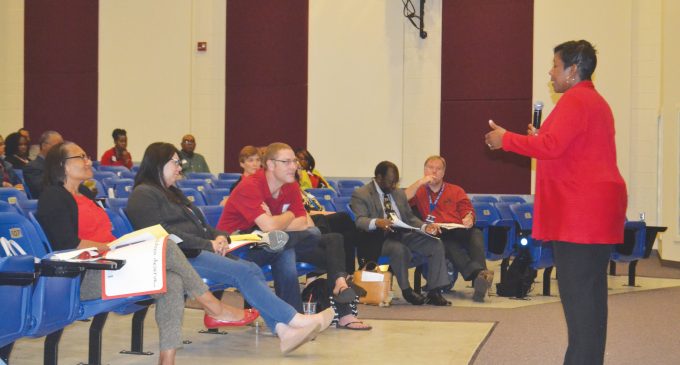Teachers and parents get ESSA crash course
National Education Association organizational specialist LaToya Johnson leads a question and answer session during a forum hosted by the Forsyth County Educators Association.

Photo by Tevin Stinson
BY TEVIN STINSON
THE CHRONICLE
This fall, school districts across the country will be required to submit accountability plans to the U.S. Department of Education in accordance with the Every Student Succeeds Act (ESSA), the legislation signed by former President Barack Obama in 2015 to replace No Child Left Behind (NCLB).
To jump start the conversation, at a seminar, Forsyth County Association of Educators (FCAE) President Rhonda Mays briefly discussed the law and stressed the importance of working together.
More than two dozen local teachers and parents learned how they can help shape the future of the education system during a forum hosted by the FCAE last week.
Under the ESSA, states are required to establish student performance, hold schools accountable for student achievement, and include a broader measure of student performance in their accountability systems beyond test scores.
ESSA also includes several provisions that will help ensure student success, including a requirement that all students be taught to high academic standards that will prepare them to succeed in college and careers.
The final accountability plan will be submitted by the N.C. State Board of Education and approved by elected officials.
“The reason I advocate for students and educators is because I know an equitable education with resources will provide what students need to be successful in the future,” said Mays. “Educators in public education are charged with the responsibility of educating every child that walks in our doors and we cannot do that alone.”
Mays mentioned that working together is a key component of ESSA. She said ESSA provides opportunities for students, families, educators, and the community to get involved with molding our education system.
“When you leave here tonight, it is my hope that you have a better understanding of ESSA and that you have decided what you will commit to help the implementation of ESSA.” To help teachers and parents discover ways their voices can be heard, Mays called on the assistance of
National Education Association (NEA) executive committee member George Sheridan.
Sheridan, who has taught every grade level from kindergarten to 12, said ESSA finally gives educators a seat at the table where important decisions a are made.
“The new education law gives us more say in our classrooms and a seat at the table to determine what really matters to student success, so we must make sure our voices are heard,” said Sheridan. “ESSA is about student success and that is a huge shift away from the failed test and punish approach of the No Child Left Behind Act but, it will only work for our students if we get involved and shape how it is put into action in our ,classrooms and schools.”
He said, “The voices that matter most are the people who love the students most. We are more powerful when teachers and parents speak together to become one voice.”
Next, Sheridan encouraged the large group of parents and educators to let school board officials know what they want by identifying what success looks like, what resources students, teachers, and schools need to achieve success, and hold elected officials accountable.
“Public schools were created to provide access to the civil rights and civil participation as well as economic opportunity,” continued Sheridan. “Right now, is a good time to tell your member of congress to oppose the Trump-DeVos budget and not cut funding for public education.”
To wrap up the forum, NEA organizational specialist for the Mid-Atlantic Region LaToya Johnson led a question and answer session. When asked what they needed to create a more inclusive learning environment several teachers said more support staff, more materials, more planning time for teachers and assistants, more technology in classrooms, and equal spending at all schools in the district. After listening to their needs, Johnson told the educators to take the next step and continue the conversation with others in the community.
“You’ve just listed quite a few things that can be included in your ESSA plan. The next step is determining how do we get there,” continued Johnson. “We have to come together on this. The law states that all stakeholders have the right to come to the table and figure this law out and what’s best for students.”
She said, “Take these ideas, organize, speak out about them, develop a plan, move your action because if you don’t, it’s just something that’s floating around in your head. You have to be determined to make this thing better.”











